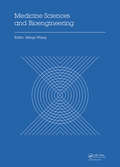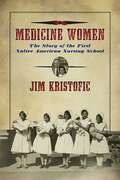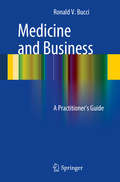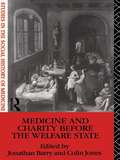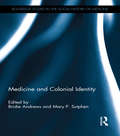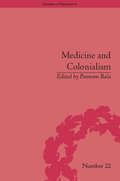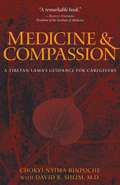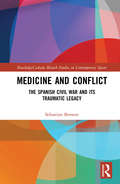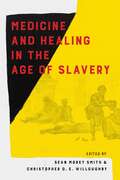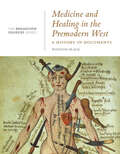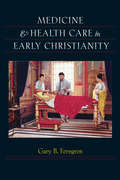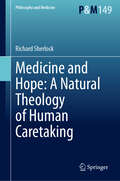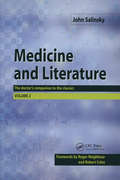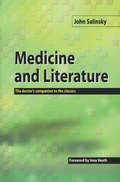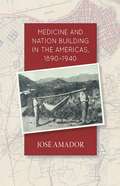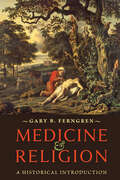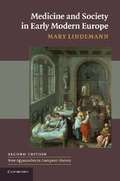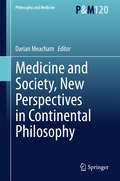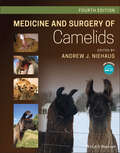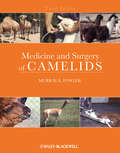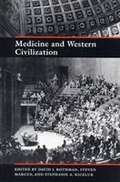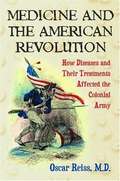- Table View
- List View
Medicine Sciences and Bioengineering: Proceedings of the 2014 International Conference on Medicine Sciences and Bioengineering (ICMSB2014), Kunming, Yunnan, China, August 16-17, 2014
by Mings WangThis proceedings volume contains selected papers presented at the 2014 International Conference on Medicine Sciences and Bioengineering (ICMSB 2014), held August 16-17, 2014 in Kunming, Yunnan, China. ICMSB2014 was aimed at researchers, engineers, industrial professionals and academics, who were broadly welcomed to present their latest research res
Medicine Women: The Story of the First Native American Nursing School
by Jim KristoficAfter the Indian wars, many Americans still believed that the only good Indian was a dead Indian. But at Ganado Mission in the Navajo country of northern Arizona, a group of missionaries and doctors—who cared less about saving souls and more about saving lives—chose a different way and persuaded the local parents and medicine men to allow them to educate their daughters as nurses. The young women struggled to step into the world of modern medicine, but they knew they might become nurses who could build a bridge between the old ways and the new.In this detailed history, Jim Kristofic traces the story of Ganado Mission on the Navajo Indian Reservation. Kristofic&’s personal connection with the community creates a nuanced historical understanding that blends engaging narrative with careful scholarship to share the stories of the people and their commitment to this place.
Medicine and Business
by Ronald V. BucciThis book is designed to provide physicians with the information they need in applying business management skills to their medical practice. It covers management and leadership practices, financial planning and execution, hospital governance, managed care, marketing activities, and medical business law. Written for the physician in easily understandable language, it describes each concept, delineates its applications in various practice environments and provides insight into the future developments in each sector.
Medicine and Charity Before the Welfare State (Studies In The Social History Of Medicin Ser.)
by Colin Jones Jonathan BarryWhat have been the roles of charities and the state in supporting medical provision? These are issues of major relevance, as the assumptions and practices of the welfare state are increasingly thrown into doubt. This title offers a broad perspective on the relationship between charity and medicine in Western Europe, up to the advent of welfare states in the 20th century. Through detailed case studies, the authors highlight significant differences between Britain, France, Italy and Germany, and offer a critical vocabulary for grasping the issues raised. This volume reflects recent developments relating to the role of charity in medicine, particularly the revival of interest in the place of voluntary provision in contemporary social policy. It emphasizes the changing balance of "care" and "cure" as the aim of medical charity, and shows how economic and political factors influenced the various forms of charity.
Medicine and Colonial Identity (Routledge Studies in the Social History of Medicine)
by Bridie Andrews Mary P. SutphenOver the last century, identity as an avenue of inquiry has become both an academic growth industry and a problematic category of historical analysis. This volume shows how the study of medicine can provide new insights into colonial identity, and the possibility of accommodating multiple perspectives on identity within a single narrative. Contributors to this volume explore the perceived self-identity of colonizers; the adoption of western and traditional medicine as complementary aspects of a new, modern and nationalist identity; the creation of a modern identity for women in the colonies; and the expression of a healer's identity by physicians of traditional medicine.
Medicine and Colonialism: Historical Perspectives in India and South Africa (Empires in Perspective #22)
by Poonam BalaFocusing on India and South Africa during the nineteenth and twentieth centuries, the essays in this collection address power and enforced modernity as applied to medicine. Clashes between traditional methods of healing and the practices brought in by colonizers are explored across both territories.
Medicine and Compassion
by Erik Pema Kunsang Harvey Fineberg Donald Fineberg Chokyi Nyima Rinpoche David R ShlimIt is estimated that some 54 million people in the U.S. act as informal caregivers for ill or disabled loved ones. We can add to these countless workers in the fields of health and human service, and yet there is still not enough help to go around: as many as three fourths of our informal caregivers report "going it alone." It's no wonder that "caregiver burnout" and depression afflict so many. Sure to be welcomed by caregivers of all types, the groundbreaking new Medicine and Compassion can help anyone reconnect with the true spirit of their caregiving task. In a clear and very modern voice, Chokyi Nyima Rinpoche and Dr. David R. Shlim use the teachings of Tibetan Buddhist philosophy to present practical tools for revitalizing the caring spirit. Readers, in turn, will find their patience, kindness, and effectiveness re-energized. Offering practical advice on dealing with people who are angry at their medical conditions or their care providers, people who are dying, or the families of those who are critically ill, Medicine and Compassion will strike resonant cords with medical professionals, hospice workers, teachers and parents of children with special needs, and those caring for aging and infirm loved ones.
Medicine and Conflict: The Spanish Civil War and its Traumatic Legacy (Routledge/Canada Blanch Studies on Contemporary Spain)
by Sebastian BrowneThis book focuses on an important but neglected aspect of the Spanish Civil War, the evolution of medical and surgical care of the wounded during the conflict. Importantly, the focus is from a mainly Spanish perspective – as the Spanish are given a voice in their own story, which has not always been the case. Central to the book is General Franco’s treatment of Muslim combatants, the anarchist contribution to health, and the medicalisation of propaganda – themes that come together in a medico-cultural study of the Spanish Civil War. Suffusing the narrative and the analysis is the traumatic legacy of conflict, an untreated wound that a new generation of Spaniards are struggling to heal.
Medicine and Healing in the Age of Slavery
by Tim Lockley Deirdre Cooper Owens Chelsea Berry Robin Derby Sharla Fett Vanessa Northington Gamble Mary Hicks Rana Hogarth Elisa A. Mitchell Leslie Schwalm Brandi M. WatersCONTENTS:Foreword, Vanessa Northington Gamble“Introduction: Healing and the History of Medicine in the Atlantic World,” Sean Morey Smith and Christopher D. E. Willoughby“Zemis and Zombies: Amerindian Healing Legacies on Hispaniola,” Lauren Derby“Poisoned Relations: Medical Choices and Poison Accusations within Enslaved Communities,” Chelsea Berry“Blood and Hair: Barbers, Sangradores, and the West African Corporeal Imagination in Salvador da Bahia,1793–1843,” Mary E. Hicks“Examining Antebellum Medicine through Haptic Studies,” Deirdre Cooper Owens“Unbelievable Suffering: Rethinking Feigned Illness in Slavery and the Slave Trade,” Elise A. Mitchell“Medicalizing Manumission: Slavery, Disability, and Medical Testimony in Late Colonial Colombia,”Brandi M. Waters“A Case Study in Charleston: Impressions of the Early National Slave Hospital,” Rana A. Hogarth“From Skin to Blood: Interpreting Racial Immunity to Yellow Fever,” Timothy James Lockley“Black Bodies, Medical Science, and the Age of Emancipation,” Leslie A. Schwalm“Epilogue: Black Atlantic Healing in the Wake,” Sharla M. Fett
Medicine and Healing in the Premodern West: A History in Documents
by Winston BlackMedicine and Healing in the Premodern West traces the history of medicine and medical practice from Ancient Egypt through to the end of the Middle Ages. Featuring nearly one hundred primary documents and images, this book introduces readers to the words and ideas of men and women from across Europe and the Mediterranean Sea, from prominent physicians to humble healers. Each of the book’s ten chronological and thematic chapters is given a significant historical introduction, in which each primary source is described in its original context. Many of the included source texts are newly translated by the editor, some of them appearing in English for the first time.
Medicine and Health Care in Early Christianity
by Gary B. FerngrenDrawing on New Testament studies and recent scholarship on the expansion of the Christian church, Gary B. Ferngren presents a comprehensive historical account of medicine and medical philanthropy in the first five centuries of the Christian era.Ferngren first describes how early Christians understood disease. He examines the relationship of early Christian medicine to the natural and supernatural modes of healing found in the Bible. Despite biblical accounts of demonic possession and miraculous healing, Ferngren argues that early Christians generally accepted naturalistic assumptions about disease and cared for the sick with medical knowledge gleaned from the Greeks and Romans.Ferngren also explores the origins of medical philanthropy in the early Christian church. Rather than viewing illness as punishment for sins, early Christians believed that the sick deserved both medical assistance and compassion. Even as they were being persecuted, Christians cared for the sick within and outside of their community. Their long experience in medical charity led to the creation of the first hospitals, a singular Christian contribution to health care.
Medicine and Hope: A Natural Theology of Human Caretaking (Philosophy and Medicine #149)
by Richard SherlockThis book expands, in a modest way, the discussion of hope and does so by focusing on a field where it is at the core of care-taking: medicine. The three great religious virtues of medieval theology were faith, hope, and love. An enormous literature exists about faith and love, but much less exists about hope. Doctors often know what they want to do for a patient but do not know whether they are able to have a good result. If they fail, will the result be worse? They must hope they can succeed. In other cases, they know what they can do but they are uncertain whether they should. If they do not undertake action, will the patient try to do it themselves with a much worse result? Questions such as these raise the issue of the importance of hope in medicine. This book builds on an insight from the first modern textbook of medical ethics, Thomas Percival’s 1803 classic Medical Ethics. There Percival says that the doctor is a “minister of hope to the sick”. This book analyses this concept, which is central to the practice of medicine.
Medicine and Literature, Volume Two: The Doctor's Companion to the Classics
by John Salinsky‘When I want to know the real rock-bottom truth about what happens all the time in this doctoring life, what happens to us, and to the folks who bring us their hearts and worries to be heard, that’s when I turn, every time, to the novelists, the playwrights, the poets, the essayists, who have given us the sights and sounds, the feel, of all that goes on, minute by minute. What Tolstoy and Chekhov knew, we need to know for ourselves, for our own sakes, as we live out our medical lives.’ William Carlos Williams ‘The most fundamental of all consulting skills is genuine curiosity about other people, the constant urge to wonder ‘Why are they as they are?’ We should open our minds to the life of the imagination not just for its entertainment value, but for the mindset of curiosity it engenders in us. Such books as John Salinsky describes in this and his previous volume combine powerful opportunities for our own professional growth with pleasure and recreation too.’ Roger Neighbour in his Foreword ‘This carefully assembled, wonderfully telling book is a “companion,” for sure, a lasting and most helpful one, for the medical travelling that awaits us.’ Robert Coles in his Foreword.
Medicine and Literature: The Doctor's Companion to the Classics
by John SalinskyHere are 120 multiple choice questions on family planning and reproductive health care. Each question has been carefully selected to reflect the syllabus of the new Part 1 examination for Membership of the Faculty of Family Planning and Reproductive Healthcare (MFFP). Almost all the questions are accompanied by an extented answer. In this way as well as providing a useful revision aid for examinations the book is also educationally stimulating for anyone wishing to improve and test their knowledge of family planning and reproductive healthcare. The questions have been divided in three major sections: Applied Sciences; Contraception; and Reproductive Healthcare. This book will be an ideal training and revision tool for candidates for the professional exams such as the new MFFP as well as the MRCOG and MRCGP. It will also provide a useful aid to anyone who wishes to update their understanding of these important topics in reproductive medicine.
Medicine and Nation Building in the Americas, 1890-1940
by Jose AmadorAs medical science progressed through the nineteenth century, the United States was at the forefront of public health initiatives across the Americas. Dreadful sanitary conditions were relieved, lives were saved, and health care developed into a formidable institution throughout Latin America as doctors and bureaucrats from the United States flexed their scientific muscle. This wasn't a purely altruistic enterprise, however, as Jose Amador reveals in Medicine and Nation Building in the Americas, 1890-1940. Rather, these efforts almost served as a precursor to modern American interventionism. For places like Cuba, Puerto Rico, and Brazil, these initiatives were especially invasive.Drawing on sources in Cuba, Puerto Rico, Brazil, and the United States, Amador shows that initiatives launched in colonial settings laid the foundation for the rise of public health programs in the hemisphere and transformed debates about the formation of national culture. Writers rethought theories of environmental and racial danger, while Cuban reformers invoked the yellow fever campaign to exclude nonwhite immigrants. Puerto Rican peasants flooded hookworm treatment stations, and Brazilian sanitarians embraced regionalist and imperialist ideologies. Together, these groups illustrated that public health campaigns developed in the shadow of empire propelled new conflicts and conversations about achieving modernity and progress in the tropics.
Medicine and Nation Building in the Americas, 1890-1940
by Jose AmadorAs medical science progressed through the nineteenth century, the United States was at the forefront of public health initiatives across the Americas. Dreadful sanitary conditions were relieved, lives were saved, and health care developed into a formidable institution throughout Latin America as doctors and bureaucrats from the United States flexed their scientific muscle. This wasn't a purely altruistic enterprise, however, as Jose Amador reveals in Medicine and Nation Building in the Americas, 1890-1940. Rather, these efforts almost served as a precursor to modern American interventionism. For places like Cuba, Puerto Rico, and Brazil, these initiatives were especially invasive. Drawing on sources in Cuba, Puerto Rico, Brazil, and the United States, Amador shows that initiatives launched in colonial settings laid the foundation for the rise of public health programs in the hemisphere and transformed debates about the formation of national culture. Writers rethought theories of environmental and racial danger, while Cuban reformers invoked the yellow fever campaign to exclude nonwhite immigrants. Puerto Rican peasants flooded hookworm treatment stations, and Brazilian sanitarians embraced regionalist and imperialist ideologies. Together, these groups illustrated that public health campaigns developed in the shadow of empire propelled new conflicts and conversations about achieving modernity and progress in the tropics.This book is a recipient of the annual Norman L. and Roselea J. Goldberg Prize for the best project in the area of medicine.
Medicine and Public Health in Latin America
by Steven Palmer Marcos CuetoDespite several studies on the social, cultural, and political histories of medicine and of public health in different parts of Latin America and the Caribbean, local and national focuses still predominate, and there are few panoramic studies that analyze the overarching tendencies in the development of health in the region. This comprehensive book summarizes the social history of medicine, medical education, and public health in Latin America and places it in dialogue with the international historiographical currents in medicine and health. Ultimately, this text provides a clear, broad, and provocative synthesis of the history of Latin American medical developments while illuminating the recent challenges of global health in the region and other developing countries.
Medicine and Religion: A Historical Introduction
by Gary B. FerngrenExplores the interplay of medicine and religion in Western societies.Medicine and Religion is the first book to comprehensively examine the relationship between medicine and religion in the Western tradition from ancient times to the modern era. Beginning with the earliest attempts to heal the body and account for the meaning of illness in the ancient Near East, historian Gary B. Ferngren describes how the polytheistic religions of ancient Mesopotamia, Egypt, Greece, and Rome and the monotheistic faiths of Judaism, Christianity, and Islam have complemented medicine in the ancient, medieval, and modern periods.Ferngren paints a broad and detailed portrait of how humans throughout the ages have drawn on specific values of diverse religious traditions in caring for the body. Religious perspectives have informed both the treatment of disease and the provision of health care. And, while tensions have sometimes existed, relations between medicine and religion have often been cooperative and mutually beneficial. Religious beliefs provided a framework for explaining disease and suffering that was larger than medicine alone could offer. These beliefs furnished a theological basis for a compassionate care of the sick that led to the creation of the hospital and a long tradition of charitable medicine.Praise for Medicine and Health Care in Early Christianity, by Gary B. Ferngren"This fine work looks forward as well as backward; it invites fuller reflection of the many senses in which medicine and religion intersect and merits wide readership."—JAMA"An important book, for students of Christian theology who understand health and healing to be topics of theological interest, and for health care practitioners who seek a historical perspective on the development of the ethos of their vocation."—Journal of Religion and Health
Medicine and Society in Early Modern Europe
by Mary LindemannThis book offers students a concise introduction to health and healing in Europe from 1500 to 1800. Bringing together the best recent research in the field, the author examines medicine from a social and cultural perspective, rather than a narrowly scientific one. <p><p> Drawing on medical anthropology, sociology, and ethics as well as cultural and social history, she focuses on the experience of illness and on patients and folk healers as much as on the rise of medical science, doctors, and hospitals. This second edition has been updated and revised throughout in content, style, and interpretations, and new material has been added, in particular, on colonialism, exploration, and women. <p><p> Accessibly written and full of fascinating insights, this will be essential reading for all students of the history of medicine and will provide invaluable context for students of early modern Europe more generally.
Medicine and Society, New Perspectives in Continental Philosophy
by Darian MeachamThis volume addresses some of the most prominent questions in contemporary bioethics and philosophy of medicine: 'liberal' eugenics, enhancement, the normal and the pathological, the classification of mental illness, the relation between genetics, disease and the political sphere, the experience of illness and disability, and the sense of the subject of bioethical inquiry itself. All of these issues are addressed from a "continental" perspective, drawing on a rich tradition of inquiry into these questions in the fields of phenomenology, philosophical hermeneutics, French epistemology, critical theory and post-structuralism. At the same time, the contributions engage with the Anglo-American debate, resulting in a fruitful and constructive conversation that not only shows the depth and breadth of continental perspectives in bioethics and medicine, but also opens new avenues of discussion and exploration. For decades European philosophers have offered important insights into the relation between the practices of medicine, the concept of illness, and society more broadly understood. These interventions have generally striven to be both historically nuanced and accessible to non-experts. From Georges Canguilhem's seminal The Normal and the Pathological, Michel Foucault's lectures on madness, sexuality, and biopolitics, Hans Jonas's deeply thoughtful essays on the right to die, life extension, and ethics in a technological age, Hans-Georg Gadamer's lectures on The Enigma of Health, and more recently Jürgen Habermas's carefully nuanced interventions on the question of liberal eugenics, these thinkers have sought to engage the wider public as much as their fellow philosophers on questions of paramount importance to current bioethical and social-political debate. The essays contained here continue this tradition of engagement and accessibility. In the best practices of European philosophy, the contributions in this volume aim to engage with and stimulate a broad spectrum of readers, not just experts. In doing so the volume offers a showcase of the richness and rigor of continental perspectives on medicine and society.
Medicine and Surgery of Camelids
by Andrew J. NiehausA thoroughly updated new edition of the classic veterinary reference In the newly revised Fourth Edition of Medicine and Surgery of Camelids, accomplished veterinary surgeon, Dr. Andrew J. Niehaus delivers a comprehensive reference to all aspects of camelid medicine and surgery. The book covers general husbandry, restraint, nutrition, diagnosis, anesthesia, surgery, and the treatment of specific diseases veterinarians are likely to encounter in camelid patients. Although the focus of the text remains on llamas and alpacas, camel-specific information has received more attention than in previous editions with a chapter dedicated to old-world camelids. The editor revitalizes the emphasis on evidence-based information and pathophysiology and draws on the experience of expert contributors to provide up-to-date and authoritative material on nutrition, internal medicine, and more. A classic text of veterinary medicine, this latest edition comes complete with high-quality color photographs and access to a companion website that offers supplementary resources. Readers will also find: A thorough introduction to the general biology and evolution of camelids, as well as their husbandry and handling Comprehensive explorations of camelid physical exams, diagnostics, anesthesia, pain management, and surgery Topical discussions arranged by body system including the integumentary system, the musculoskeletal system and multisystem disorders Chapters dedicated to camelid radiology, parasitology, and diagnostic clinical pathology In-depth examinations of camelid toxicology, neonatology, and congenital diseases Perfect for veterinary specialists and general practitioners, Medicine and Surgery of Camelids will also earn a place in the libraries of veterinary students and trainees with an interest in camelids.
Medicine and Surgery of Camelids: Llama, Alpaca, Vicuna, Guanaco
by Murray FowlerMedicine and Surgery of Camelids is the classic comprehensive reference on llamas, alpacas, vicunas, guanacos, and camels. With information on topics ranging from nutrition and management to infectious diseases and emergency care, this book provides information on the health and maintenance of these species. Updates to the Third Edition include new information on camels; full color throughout; significant revisions to the parentage verification, infectious diseases, anesthesia, restraint, and nutrition sections; and additional information on the alpaca genome. This is an essential resource for practicing veterinarians, zoo veterinarians, and veterinary students.
Medicine and Warfare: Spain, 1936–1939 (Routledge/Canada Blanch Studies on Contemporary Spain)
by Nicholas ConiThis original work examines the differences in medical advances on the two sides of the Spanish Civil War. Covering all aspects of medical treatment during the war, Coni covers new ground with great aplomb and delivers a book which will interest scholars involved with medical history as well as those interested in contemporary European history.
Medicine and Western Civilization
by David J. Rothman Steven Marcus Stephanie A. KicelukHowever, the brief background material for the selections center around the authors and offer little or no discussion about the selections' relevance to the topics at hand. This book would be best read in a class or group where the texts' meaning in relation to each other can be discussed, but the book can stand alone if the reader is prepared to do some critical thinking.
Medicine and the American Revolution: How Diseases and Their Treatments Affected the Colonial Army
by Oscar ReissNearly nine times as many died from diseases during the American Revolution as did from wounds. Poor diet, inadequate sanitation and sometimes a lack of basic medical care caused such diseases as dysentery, scurvy, typhus, smallpox and others to decimate the ranks. Scurvy was a major problem for both the British and American navies, while venereal diseases proved to be a particularly vexing problem in New York. Respiratory diseases, scabies and other illnesses left nearly 4,000 colonial troops unable to fight when George Washington's troops broke camp at Valley Forge in June 1778. From a physician's perspective, this is a unique history of the American Revolution and how diseases impacted the execution of the war effort. The medical histories of Washington and King George III are also provided.
